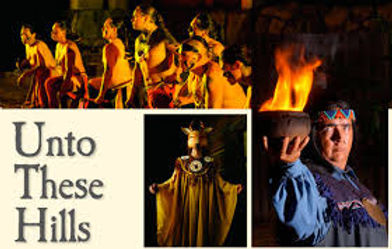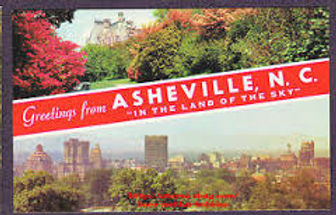A spectacular reimagining of the Cherokee story, “Unto These Hills” is an outdoor drama that stirs the soul nightly. This production portrays the gripping legacy of the Cherokee people through their power, through the heartbreak of the Trail of Tears, and finally ending in the present day where the Cherokee people continue to rewrite their place in the world: a place based in traditional Cherokee values and modern sensibilities. Thousands of years in the making, "Unto These Hills" covers ritual, betrayal, love, action, suspense, and loss. Talented actors dressed in gorgeous costumes dance and sing amid elaborate sets complete with fog and fire, haunting music, and thundering surround-sound effects.

The town of Boone, NC, is named for the famous American pioneer and explorer Daniel Boone, and every summer since 1952 has hosted an outdoor amphitheater a showing of the life and times of Daniel Boone. In addition to nationally known attractions like Grandfather Mountain, the Blue Ridge Parkway and Tweetsie Railroad, Boone also has a vibrant art, history, and cultural scene. Appalachian State University is located in Boone. The adventure doesn't end when the colder weather begins. The Boone area has plenty of ski slopes across the entire region like Beech Mountain Ski Resort. For others, there is snowboarding, snow tubing, sledding, ice-skating, snowshoeing, and cross country skiing.




Because it is the most western town in North Carolina, Murphy, the county seat of Cherokee County, has the distinction of being known as both the first and last town in North Carolina, depending on which way you're going, of course. Murphy combines a rich, interesting past with a strong promising future.
Soon after arriving in the US, Christopher Bechtler began to buy land in the gold-mining region of Rutherford County. Deed books from the 1830s show that Bechtler purchased several thousand acres of land over the next few years, always along a stream or river where gold was most likely to be found. Bechtler was evidently seriously infected with gold fever. As late as 1837, a visitor to his farm observed that Bechtler held “mystical” notions about gold and “great enthusiasm” for gold mining. Using equipment that he made himself, including a roller, screw press and dies, Bechtler and his sons struck both $2.50 and $5 coins. Their coin designs were simple, having only the Bechtler name, the value, purity, and location.
Asheville was a primitive outpost in 1797. Frontiersmen such as Daniel Boone and Davy Crockett traveled through in the early days. Asheville was little more than a crossroads of Indian trails on a plateau surrounded by mountains and rivers on all sides.
The railroad transformed Asheville and Buncombe County into a resort and therapeutic health center when it arrived in 1880. Asheville became famous for visitors searching for a mountain escape, its population climbing to nearly 30,000 seasonal residents in 1890. It is known as "The Land of the Sky." Asheville has always drawn visionaries, poets and explorers. George W. Vanderbilt came to Asheville in the late 1880s and quickly purchased 120,000 acres to build his grand estate.
Thomas Wolfe was born in Asheville and grew up in his mother's rambling boardinghouse, known as "Dixieland." Wolfe is one of the giants of American literature, and Asheville is the backdrop for his autobiographical novel, "Look Homeward, Angel."